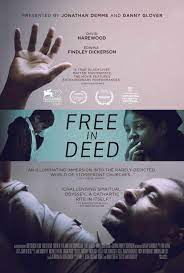
FREE IN DEED
New Zealand, 2015, 100 minutes, Colour.
David Harewood, Edwina Findlay, Preston Booth.
Directed by Jake Mahaffey.
It is surprising to find that this film is a New Zealand production. However, it was filmed in Memphis, Tennessee, in actual shopfront church is with actual members of the congregation, nonprofessionals.
The film presupposes the world of Pentecostals, the gatherings, the press styles, singing of hymns, the leadership and the intense preaching and rousing the congregation, slaying in the spirit, cure is, religious enthusiasm.
The narrative focuses on an African-American middle-aged man, A (British actor David Harewood), something of a derelict experience, going to the church, a conversion experience, his discovery that he had an ability in leadership, hands-on ministry, slaying in the spirit, then a desire to heal. He comes across a single mother with two children, the boy hyper Connecticut, uncontrollable, getting medical help and still breaking out. An elderly lady from the church introduces the mother to the church and to A.
At the core of the film is the sometimes offhand medical care for the boy and the intense attention given by a, many ceremonies in the church, attempts at healing – until a final attempt which is, literally, fatal, leading to AIDS arrest and arraignment. And a very striking final sequence where he returns to the church, calling on his hands and knees, groaning – leading to the audience to reflect on what has happened to him and what his future might be.
At the same time a portrait of Pentecostal prayer and activity as well is some critique.
- The world of Pentecostal churches? Prayer, experiences of the spirit, leaders in their preaching, hymns, emotions and gesticulating is, slaying in the spirit, healings? The film’s portrayal? Critique?
- Filmed in Memphis, in actual churches, with participants, nonprofessionals as well as professional cast?
- The focus on Abe, African-American, age, experience, accommodation at the motel, janitor in the schools, his religious experience, his conversion, faith in Jesus as his personal saviour? The consequences for his life, helping with the soup kitchen but being moved on? Attendance at the prayer meetings? The encounter with Melva and her son, his compassion, his hopes for healing? His own experiences of being able to slay in the spirit? The continued press services, in the church, his visit at home, support of Melva, the effect on the son, no effect? Melva and her dependence on A, the kiss? The repercussions for A? The final ceremony, two hours on the boy, his death? The police, the investigation, the charges, his explanations, the arraignment, his plea? On his own, returning to the church, crawling on his hands and knees groaning? His future?
- Melva, single mother, her children, devotion, looking after the boy, hyper Connecticut, unable to control him, the visits to the doctor, medication, school and his not being able to attend, the disturbances? Melva and the old lady, the discussion about prayer, going to the church, her religious experience, relying on A, the dependence, the attempts to heal the boy, the emotional and physical attraction? Her son’s death?
- The old lady, her support of Melva, prayer, a church? The other members of the congregation, the Bishop and his leadership, enthusiasm, preaching? The leader with the elaborate hat, slaying in the spirit? The atmosphere of these churches – small, shopfront?
- The portrait of doctors, medical consulting, their help, their detachment?
- Audiences immersed in this Pentecostal world, the hopes for healing, the faith in Jesus, spiritual communication? Get the failure to heal the boy? His death?